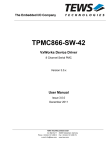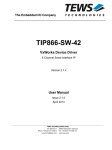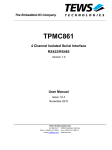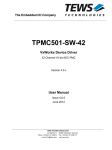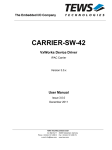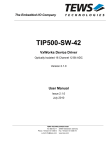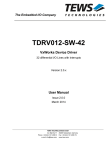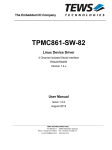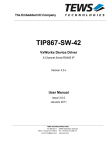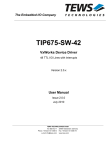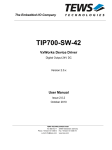Download TPMC861-SW-42
Transcript
The Embedded I/O Company TPMC861-SW-42 VxWorks Device Driver 4 Channel Isolated Serial Interface (RS422/RS485) Version 3.0.x User Manual Issue 3.0.0 August 2010 TEWS TECHNOLOGIES GmbH Am Bahnhof 7 25469 Halstenbek, Germany Phone: +49 (0) 4101 4058 0 Fax: +49 (0) 4101 4058 19 e-mail: [email protected] www.tews.com TPMC861-SW-42 VxWorks Device Driver 4 Chan. Isolated Serial Interface (RS422/RS485) This document contains information, which is proprietary to TEWS TECHNOLOGIES GmbH. Any reproduction without written permission is forbidden. TEWS TECHNOLOGIES GmbH has made any effort to ensure that this manual is accurate and complete. However TEWS TECHNOLOGIES GmbH reserves the right to change the product described in this document at any time without notice. Supported Modules: TPMC861 TEWS TECHNOLOGIES GmbH is not liable for any damage arising out of the application or use of the device described herein. 2001-2010 by TEWS TECHNOLOGIES GmbH Issue Description Date 1.0 First Issue July 7, 2001 1.1 Overrun Error added February 18, 2001 1.2 Mark/Space Parity added June 26, 2003 2.0.0 New File List, tpmc861Drv() and tpmc861DevCreate() have changed, Description of tpmc861PciInit() added, Advanced description of the ioctl() function codes August 14, 2006 2.0.1 New Address TEWS LLC October 10, 2006 2.0.2 Description of BSP dependencies February 12, 2007 2.1.0 Description of default configuration, Description how to include device driver into VxWorks projects modified, Address TEWS LLC removed July 6, 2009 3.0.0 New version of driver, Legacy and VxBus-Support August 30, 2010 TPMC861-SW-42 – VxWorks Device Driver Page 2 of 42 Table of Contents 1 INTRODUCTION......................................................................................................... 4 1.1 Device Driver ...................................................................................................................................4 2 INSTALLATION.......................................................................................................... 5 2.1 Legacy vs. VxBus Driver ................................................................................................................6 2.2 VxBus Driver Installation ...............................................................................................................6 2.2.1 Direct BSP Builds.................................................................................................................8 2.2.2 Modification of the ‘Number of serial ports’..........................................................................8 2.3 Legacy Driver Installation ..............................................................................................................9 2.3.1 Include device driver in VxWorks projects ...........................................................................9 2.3.2 Special installation for Intel x86 based targets ....................................................................9 2.3.3 BSP dependent adjustments .............................................................................................10 2.4 System resource requirement .....................................................................................................11 2.5 Default Configuration ...................................................................................................................12 3 VXBUS DRIVER SUPPORT ..................................................................................... 13 3.1 Assignment of Port Names ..........................................................................................................13 3.2 VxBus Error Codes .......................................................................................................................13 3.3 Compatibility to pre-VxBus applications....................................................................................14 4 LEGACY I/O SYSTEM FUNCTIONS........................................................................ 15 4.1 4.2 4.3 4.4 5 tpmc861Drv() .................................................................................................................................15 tpmc861DevCreate() .....................................................................................................................17 tpmc861PciInit() ............................................................................................................................19 tpmc861Init()..................................................................................................................................20 BASIC I/O FUNCTIONS ........................................................................................... 22 5.1 5.2 5.3 5.4 5.5 open() .............................................................................................................................................22 close().............................................................................................................................................24 read() ..............................................................................................................................................26 write() .............................................................................................................................................28 ioctl() ..............................................................................................................................................30 5.5.1 FIOBAUDRATE..................................................................................................................32 5.5.2 FIO_EXAR16XXX_DATABITS ..........................................................................................33 5.5.3 FIO_EXAR16XXX_STOPBITS ..........................................................................................34 5.5.4 FIO_EXAR16XXX_PARITY ...............................................................................................35 5.5.5 FIO_EXAR16XXX_SETBREAK.........................................................................................36 5.5.6 FIO_EXAR16XXX_CLEARBREAK....................................................................................37 5.5.7 FIO_EXAR16XXX_CHECKBREAK ...................................................................................38 5.5.8 FIO_EXAR16XXX_CHECKERRORS ................................................................................39 5.5.9 FIO_EXAR16XXX_RECONFIGURE .................................................................................40 5.5.10 FIO_EXAR16XXX_FIFO................................................................................................41 TPMC861-SW-42 – VxWorks Device Driver Page 3 of 42 1 Introduction 1.1 Device Driver The TPMC861-SW-42 VxWorks device driver software allows the operation of the supported modules conforming to the VxWorks I/O system specification. This includes a device-independent basic I/O interface with open(), close(), read(), write(), and ioctl() functions and a buffered I/O interface (fopen(), fclose(), fprintf(), fscanf(), ...). Special I/O operation that do not fit to the standard I/O calls will be performed by calling the ioctl() function with a specific function code and an optional function dependent argument. The TPMC861-SW-42 release contains independent driver sources for the old legacy (pre-VxBus) and the new VxBus-enabled driver model. The VxBus-enabled driver is recommended for new developments with later VxWorks 6.x release and mandatory for VxWorks SMP systems. The TPMC861 driver includes the following functions supported by the VxWorks tty driver support library for pre-VxBus systems or the sio driver library for VxBus compatible systems. ring buffering of input and output raw mode optional line mode with backspace and line-delete functions optional processing of X-on/X-off optional RETURN/LINEFEED conversion optional echoing of input characters optional stripping of the parity bit from 8 bit input optional special characters for shell abort and system restart Additionally the following optional functions: select FIFO triggering point use 5...8 bit data words use 1, 1.5 or 2 stop bits optional even or odd parity changing baudrates The TPMC861-SW-42 supports the modules listed below: TPMC861-10 4 Channel Isolated Serial Interface (RS422/RS485) (PMC) To get more information about the features and use of supported devices it is recommended to read the manuals listed below. TPMC861 User Manual TPMC861 Engineering Manual TPMC861-SW-42 – VxWorks Device Driver Page 4 of 42 2 Installation Following files are located on the distribution media: Directory path ‘TPMC861-SW-42’: TPMC861-SW-42-3.0.0.pdf TPMC861-SW-42-VXBUS.zip TPMC861-SW-42-LEGACY.zip ChangeLog.txt Release.txt PDF copy of this manual Zip compressed archive with VxBus driver sources Zip compressed archive with legacy driver sources Release history Release information The archive TPMC861-SW-42-VXBUS.zip contains the following files and directories: Directory path ‘./tews/tpmc861’: tpmc861drv.c tpmc861def.h tpmc861defaults.h tpmc861.h exar16xxxDrv.c exar16xxxDef.h exar16xxx.h Makefile 40tpmc861.cdf tpmc861.dc tpmc861.dr include/tvxbHal.h apps/tpmc861exa.c TPMC861 device driver source (TPMC861 specific) TPMC861 driver include file TPMC861 device default configuration TPMC861 include file for driver and application device driver source (controller specific) driver include file (controller specific) include file for driver and application (controller specific) Driver Makefile Component description file for VxWorks development tools Configuration stub file for direct BSP builds Configuration stub file for direct BSP builds Hardware dependent interface functions and definitions Example application The archive TPMC861-SW-42-LEGACY.zip contains the following files and directories: Directory path ‘./tpmc861’: tpmc861drv.c tpmc861def.h tpmc861defaults.h tpmc861.h tpmc861pci.c exar16xxxDrv.c exar16xxxDef.h exar16xxx.h tpmc861exa.c include/tdhal.h TPMC861-SW-42 – VxWorks Device Driver TPMC861 device driver source TPMC861 driver include file TPMC861 device default configuration TPMC861 include file for driver and application TPMC861 device driver source for x86 based systems device driver source (controller specific) driver include file (controller specific) include file for driver and application (controller specific) Example application Hardware dependent interface functions and definitions Page 5 of 42 2.1 Legacy vs. VxBus Driver In later VxWorks 6.x releases, the old VxWorks 5.x legacy device driver model was replaced by VxBus-enabled device drivers. Legacy device drivers are tightly coupled with the BSP and the board hardware. The VxBus infrastructure hides all BSP and hardware differences under a well defined interface, which improves the portability and reduces the configuration effort. A further advantage is the improved performance of API calls by using the method interface and bypassing the VxWorks basic I/O interface. VxBus-enabled device drivers are the preferred driver interface for new developments. The checklist below will help you to make a decision which driver model is suitable and possible for your application: Legacy Driver VxWorks 5.x releases VxWorks releases 6.5 and VxBus Driver VxWorks 6.6 and later releases with VxBus PCI bus SMP systems (only the VxBus driver is SMP safe!) earlier VxWorks 6.x releases without VxBus PCI bus support TEWS TECHNOLOGIES recommends not using the VxBus Driver before VxWorks release 6.6. rd In previous releases required header files are missing and the support for 3 -party drivers may not be available. 2.2 VxBus Driver Installation rd Because Wind River doesn’t provide a standard installation method for 3 party VxBus device drivers the installation procedure needs to be done manually. In order to perform a manual installation extract all files from the archive TPMC861-SW-42-VXBUS.zip rd to the typical 3 party directory installDir/vxworks-6.x/target/3rdparty (whereas installDir must be substituted by the VxWorks installation directory). After successful installation the TPMC861 device driver is located in the vendor and driver-specific directory installDir/vxworks-6.x/target/3rdparty/tews/tpmc861. At this point the TPMC861 driver is not configurable and cannot be included with the kernel configuration tool in a Wind River Workbench project. To make the driver configurable the driver library for the desired processer (CPU) and build tool (TOOL) must be built in the following way: (1) Open a VxWorks development shell (e.g. C:\WindRiver\wrenv.exe -p vxworks-6.7) (2) Change into the driver installation directory installDir/vxworks-6.x/target/3rdparty/tews/tpmc861 (3) Invoke the build command for the required processor and build tool make CPU=cpuName TOOL=tool TPMC861-SW-42 – VxWorks Device Driver Page 6 of 42 For Windows hosts this may look like this: C:> cd \WindRiver\vxworks-6.7\target\3rdparty\tews\tpmc861 C:> make CPU=PENTIUM4 TOOL=diab To compile SMP-enabled libraries, the argument VXBUILD=SMP must be added to the command line C:> make CPU=PENTIUM4 TOOL=diab VXBUILD=SMP To integrate the TPMC861 driver with the VxWorks development tools (Workbench), the component configuration file 40tpmc861.cdf must be copied to the directory installDir/vxworks-6.x/target/config/comps/VxWorks. C:> cd \WindRiver\vxworks-6.7\target\3rdparty\tews\tpmc861 C:> copy 40tpmc861.cdf \Windriver\vxworks-6.7\target\config\comps\vxWorks In VxWorks 6.7 and newer releases the kernel configuration tool scans the CDF file automatically and updates the CxrCat.txt cache file to provide component parameter information for the kernel configuration tool as long as the timestamp of the copied CDF file is newer than the one of the CxrCat.txt. If your copy command preserves the timestamp, force to update the timestamp by a utility, such as touch. In earlier VxWorks releases the CxrCat.txt file may not be updated automatically. In this case, remove or rename the original CxrCat.txt file and invoke the make command to force recreation of this file. C:> cd \Windriver\vxworks-6.7\target\config\comps\vxWorks C:> del CxrCat.txt C:> make After successful completion of all steps above and restart of the Wind River Workbench, the TPMC861 driver can be included in VxWorks projects by selecting the “TEWS TPMC861 Driver“ component in the “hardware (default) - Device Drivers” folder with the kernel configuration tool. TPMC861-SW-42 – VxWorks Device Driver Page 7 of 42 2.2.1 Direct BSP Builds In development scenarios with the direct BSP build method without using the Workbench or the vxprj command-line utility, the TPMC861 configuration stub files must be copied to the directory installDir/vxworks-6.x/target/config/comps/src/hwif. Afterwards the vxbUsrCmdLine.c file must be updated by invoking the appropriate make command. C:> cd \WindRiver\vxworks-6.7\target\3rdparty\tews\tpmc861 C:> copy tpmc861.dc \Windriver\vxworks-6.7\target\config\comps\src\hwif C:> copy tpmc861.dr \Windriver\vxworks-6.7\target\config\comps\src\hwif C:> cd \Windriver\vxworks-6.7\target\config\comps\src\hwif C:> make vxbUsrCmdLine.c 2.2.2 Modification of the ‘Number of serial ports’ The new number of serial ports must be specified in the configuration tool. By default only the number of onboard serial ports is specified and TPMC861 will not be set up. To support the TPMC861 ports the value of ‘/hardware/peripherals/serial/SIO/number of serial ports’ (NUM_TTY) must be set (at least) to the total number of installed serial ports. For example, if there are two onboard ports and one TPMC861 with 4 ports should be supported, the value must be set to a value of 6 at least. TPMC861-SW-42 – VxWorks Device Driver Page 8 of 42 2.3 Legacy Driver Installation 2.3.1 Include device driver in VxWorks projects For including the TPMC861-SW-42 device driver into a VxWorks project (e.g. Tornado IDE or Workbench) follow the steps below: (1) Extract all files from the archive TPMC861-SW-42-LEGACY.zip to your project directory. (2) Add the device drivers C-files to your project. Make a right click to your project in the ‘Workspace’ window and use the ‘Add Files ...’ topic. A file select box appears, and the driver files in the tpmc861 directory can be selected. (3) Now the driver is included in the project and will be built with the project. For a more detailed description of the project facility please refer to your VxWorks User’s Guide (e.g. Tornado, Workbench, etc.) 2.3.2 Special installation for Intel x86 based targets The TPMC861 device driver is fully adapted for Intel x86 based targets. This is done by conditional compilation directives inside the source code and controlled by the VxWorks global defined macro CPU_FAMILY. If the content of this macro is equal to I80X86 special Intel x86 conforming code and function calls will be included. The second problem for Intel x86 based platforms can’t be solved by conditional compilation directives. Due to the fact that some Intel x86 BSP’s doesn’t map PCI memory spaces of devices which are not used by the BSP, the required device memory spaces can’t be accessed. To solve this problem a MMU mapping entry has to be added for the required TPMC861 PCI memory spaces prior the MMU initialization (usrMmuInit()) is done. The C source file tpmc861pci.c contains the function tpmc861PciInit(). This routine finds out all TPMC861 devices and adds MMU mapping entries for all used PCI memory spaces. Please insert a call to this function after the PCI initialization is done and prior to MMU initialization (usrMmuInit()). The right place to call the function tpmc861PciInit() is at the end of the function sysHwInit() in sysLib.c (it can be opened from the project Files window). Be sure that the function is called prior to MMU initialization otherwise the TPMC861 PCI spaces remains unmapped and an access fault occurs during driver initialization. Please insert the following call at a suitable place in sysLib.c: tpmc861PciInit(); Modifying the sysLib.c file will change the sysLib.c in the BSP path. Remember this for future projects and recompilations. TPMC861-SW-42 – VxWorks Device Driver Page 9 of 42 2.3.3 BSP dependent adjustments The driver includes a file called include/tdhal.h which contains functions and definitions for BSP adaptation. It may be necessary to modify them for BSP specific settings. Most settings can be made automatically by conditional compilation set by the BSP header files, but some settings must be configured manually. There are two way of modification, first you can change the include/tdhal.h and define the corresponding definition and its value, or you can do it, using the command line option –D. There are 3 offset definitions (USERDEFINED_MEM_OFFSET, USERDEFINED_IO_OFFSET, and USERDEFINED_LEV2VEC) that must be configured if a corresponding warning message appears during compilation. These definitions always need values. Definition values can be assigned by command line option -D<definition>=<value>. definition description USERDEFINED_MEM_OFFSET The value of this definition must be set to the offset between CPU-Bus and PCI-Bus Address for PCI memory space access USERDEFINED_IO_OFFSET The value of this definition must be set to the offset between CPU-Bus and PCI-Bus Address for PCI I/O space access USERDEFINED_LEV2VEC The value of this definition must be set to the difference of the interrupt vector (used to connect the ISR) and the interrupt level (stored to the PCI header ) Another definition allows a simple adaptation for BSPs that utilize a pciIntConnect() function to connect shared (PCI) interrupts. If this function is defined in the used BSP, the definition of USERDEFINED_SEL_PCIINTCONNECT should be enabled. The definition by command line option is made by -D<definition>. Please refer to the BSP documentation and header files to get information about the interrupt connection function and the required offset values. TPMC861-SW-42 – VxWorks Device Driver Page 10 of 42 2.4 System resource requirement The table gives an overview over the system resources that will be needed by the driver. Resource Driver requirement Devices requirement Memory < 1 KB < 1 KB Stack < 1 KB --- *1 Semaphores ( ) --(*1) For legacy drivers only one semaphore is used, for VxBus-driver one semaphore is used per installed board The specified requirements are specific to the driver. The VxWorks terminal manager will require extra resources for each device. Memory and Stack usage may differ from system to system, depending on the used compiler and its setup. The following formula shows the way to calculate the common requirements of the driver and devices. <total requirement> = <driver requirement> + (<number of devices> * <device requirement>) The maximum usage of some resources is limited by adjustable parameters. If the application and driver exceed these limits, increase the according values in your project. TPMC861-SW-42 – VxWorks Device Driver Page 11 of 42 2.5 Default Configuration The driver will create the port with the default configuration specified in tpmc861defaults.h. All channels will be set up with the same default configuration. If a different configuration is necessary, the configuration can be changed by modifying the file. The assigned values must be compatible to the values allowed for the corresponding ioctl() function. The following defines are made for configuration: TPMC861_DEFAULT_BAUD Specifies the default baudrate. (Default value: 9600) TPMC861_DEFAULT_OPTIONS Specifies the default terminal settings. (Default value: OPT_RAW) TPMC861_DEFAULT_RXFIFOTRIG Specifies the default receive FIFO trigger level. (Default value: 90) TPMC861_DEFAULT_TXFIFOTRIG Specifies the default transmit FIFO trigger level. (Default value: 20) TPMC861_DEFAULT_DATABITS Specifies the default length of the data word. (Default value: EXAR16XXX_DB_8) TPMC861_DEFAULT_STOPBITS Specifies the default length of the stop bit. (Default value: EXAR16XXX_SB_10) TPMC861_DEFAULT_PARITY Specifies the default parity mode. (Default value: EXAR16XXX_NOP) If an illegal value is specified in the file the default value (in the delivered file) will be used. TPMC861-SW-42 – VxWorks Device Driver Page 12 of 42 3 VxBus driver support The TPMC861 will be fully integrated to the VxWorks system and the devices will be automatically created when booting VxWorks. 3.1 Assignment of Port Names The port names are assigned automatically when the ports are created. The assigned port name will be ‘/tyCo/<n>” where <n> specifies the port number. Generally the first two port numbers (‘/tyCo/0’, ‘/tyCo/1’) are assigned to system ports and the additional ports on the TPMC861 supported boards will start with port number 2. For example a system with one TPMC861 (4 channels) will assign the following device names: st /tyCo/0 1 system port /tyCo/1 2 system port /tyCo/2 1 channel of TPMC861 /tyCo/3 2 channel of TPMC861 /tyCo/4 3 channel of TPMC861 /tyCo/5 4 channel of TPMC861 nd st nd rd th If there is more than one supported TPMC861 board installed, the assignment of the channel numbers to the boards depends on the search order of the system, but all the channels of one board will follow up in a row. After booting the available devices can be checked with devs(). This function will return a list of all created devices. If fewer devices have been created, please first check the defined maximum number of serial devices. (See 2.2.2 Modification of the ‘Number of serial ports’) 3.2 VxBus Error Codes There will be just system generated return codes for the ‘Basic I/O Functions’. The TPMC861 specific ‘Error Codes’ described with the functions are not valid for VxBus devices. TPMC861-SW-42 – VxWorks Device Driver Page 13 of 42 3.3 Compatibility to pre-VxBus applications The VxBus driver is compatible to the legacy version of this driver. The only point which must be guaranteed is, that the driver initialization is made via tpmc861Init() and not with tpmc861Drv() and tpmc861DevCreate(). Legacy compatible initialization function STATUS tpmc861Init ( int *firstChanNo, int *lastChanNo ) This routine just returns the number of the first (firstChanNo) and last (lastChanNo) port number assigned to the TPMC861 driver. The devices will be named ‘/tyCo/<firstChanNo>’ up to ‘/tyCo/<lastChanNo>’ This function has been created for compatibility to the legacy driver. It allows usage of the same example for bath, legacy and VxBus systems. It is not necessary to call this function in custom application. TPMC861-SW-42 – VxWorks Device Driver Page 14 of 42 4 Legacy I/O system functions This chapter describes the legacy driver-level interface to the I/O system. The purpose of these functions is to install the driver in the I/O system, add and initialize devices. The legacy I/O system functions are only relevant for the legacy TPMC861 driver. For the VxBus-enabled TPMC861 driver, the driver will be installed automatically in the I/O system and devices will be created as needed for detected modules. 4.1 tpmc861Drv() NAME tpmc861Drv() - installs the TPMC861 driver in the I/O system This function is not implemented for systems supporting VxBus. SYNOPSIS #include “tpmc861.h” STATUS tpmc861drv ( void ) DESCRIPTION This function searches for devices on the PCI bus, installs the TPMC861 driver in the I/O system. A call to this function is the first thing the user has to do before adding any device to the system or performing any I/O request. TPMC861-SW-42 – VxWorks Device Driver Page 15 of 42 EXAMPLE #include "tpmc861.h” STATUS result; /*------------------Initialize Driver -------------------*/ result = tpmc861Drv(); if (result == ERROR) { /* Error handling */ } RETURNS OK or ERROR. If the function fails an error code will be stored in errno. ERROR CODES The error codes are stored in errno and can be read with the function errnoGet(). Error code Description ENXIO No TPMC861 found SEE ALSO VxWorks Programmer’s Guide: I/O System TPMC861-SW-42 – VxWorks Device Driver Page 16 of 42 4.2 tpmc861DevCreate() NAME tpmc861DevCreate() – Add a TPMC861 device to the VxWorks system SYNOPSIS #include “tpmc861.h” STATUS tpmc861DevCreate ( char *name, int glbChanNo, int rdBufSize, int wrtBufSize, void *devConf ) DESCRIPTION This routine creates a device on a specified serial channel that will be serviced by the TPMC861 driver. This function must be called before performing any I/O request to this device. This function is not implemented for systems supporting VxBus. PARAMETER name This string specifies the name of the device that will be used to identify the device, for example for open() calls. devIdx This index number specifies the device to add to the system. If more than one modules are installed the channel numbers will be assigned in the order the VxWorks pciFindDevice() function will find the devices. rdBufSize This value specifies the size of the receive software FIFO. wrtBufSize This value specifies the size of the transmit software FIFO. TPMC861-SW-42 – VxWorks Device Driver Page 17 of 42 devConf This parameter is unused and should be set to NULL. EXAMPLE #include "tpmc861.h” STATUS result; /*------------------------------------------------------Create the device "/tyCo/2" for the first device 1KB transmit and receive FIFO -------------------------------------------------------*/ result = tpmc861DevCreate( "/tyCo/2", 0, 1024, 1024, NULL); if (result == OK) { /* Device successfully created */ } else { /* Error occurred when creating the device */ } RETURNS OK or ERROR. If the function fails an error code will be stored in errno. ERROR CODES The error codes are stored in errno and can be read with the function errnoGet(). Error code Description S_iosLib_DEVICE_NOT_FOUND Driver has not been started, or the specified channel has not been detected, or channel structure has not been allocated SEE ALSO VxWorks Programmer’s Guide: I/O System TPMC861-SW-42 – VxWorks Device Driver Page 18 of 42 4.3 tpmc861PciInit() NAME tpmc861PciInit() – Generic PCI device initialization SYNOPSIS void tpmc861PciInit() DESCRIPTION This function is required only for Intel x86 VxWorks platforms. The purpose is to setup the MMU mapping for all required TPMC861 PCI spaces (base address register) and to enable the TPMC861 device for access. The global variable tpmc861Status obtains the result of the device initialization and can be polled later by the application before the driver will be installed. Value Meaning >0 Initialization successful completed. The value of tpmc861Status is equal to the number of mapped PCI spaces 0 No TPMC861 device found <0 Initialization failed. The value of (tpmc861Status & 0xFF) is equal to the number of mapped spaces until the error occurs. Possible cause: Too few entries for dynamic mappings in sysPhysMemDesc[]. Remedy: Add dummy entries as necessary (sysLib.c). EXAMPLE extern void tpmc861PciInit(); tpmc861PciInit(); TPMC861-SW-42 – VxWorks Device Driver Page 19 of 42 4.4 tpmc861Init() NAME tpmc861Init() – initialize TPMC861 driver and devices and return the assigned channel numbers SYNOPSIS #include “tpmc861.h” STATUS tpmc861Init ( int *firstDevIdx, int *lastDevIdx ) DESCRIPTION This function is used by the TPMC861 example application to install the driver, to add all available devices to the VxWorks system and to determine the assigned port names. All software FIFOs (Receive / Transmit) will be configured with a size of 1KB. The function calls tpmc861Drv() and tpmc861DevCreate(). The devices will be named with ‘/tyCo/<n>’ where <n> specifies the channel. Because the default serial devices are named in the same kind, the driver searches for the first free number and will name the TPMC861 starting with this number in a row. For example already two local serial devices are created and one TPMC861 is installed, the names ‘/tyCo/0’ and ‘/tyCo/1’ are assigned to the local channels, ‘/tyCo/2’ up to ‘/tyCo/5’ will be assigned to the 4 TPMC861 channels. In this example the function will set a 2 for the first and a 5 for the last assigned device. After calling this function, it is not necessary to call tpmc861Drv() or tpmc861DevCreate() explicitly. PARAMETER firstDevIdx Pointer where the lowest assigned device number for TPMC861 devices will be returned. lastDevIdx Pointer where the highest assigned device number for TPMC861 devices will be returned. TPMC861-SW-42 – VxWorks Device Driver Page 20 of 42 EXAMPLE #include "tpmc861.h” STATUS int int char int result; firstNo; lastNo; devName[20]; chanNo; result = tpmc861Init(&firstNo, &lastNo); if (result == ERROR) { /* Error handling */ } else { for (chanNo = firstNo; chanNo <= lastNo; chanNo++) { sprintf(devName, “\tyCo\%d”, chanNo); fd = open(devName, …); … } } RETURNS OK or ERROR. If the function fails an error code will be stored in errno. ERROR CODES Error codes are only set by system functions. The error codes are stored in errno and can be read with the function errnoGet(). See 4.1 and 4.2 for a description of possible error codes. TPMC861-SW-42 – VxWorks Device Driver Page 21 of 42 5 Basic I/O Functions 5.1 open() NAME open() - open a device or file. SYNOPSIS int open ( const char *name, int flags, int mode ) DESCRIPTION Before I/O can be performed to the TPMC861 device, a file descriptor must be opened by invoking the basic I/O function open(). PARAMETER name Specifies the device which shall be opened. For the legacy driver version, the name specified for the device (e.g. by tpmc861DevCreate()) must be used. For the VxBus driver version the system assigned device name (‘/tyCo/<n>’) must be used. flags Not used mode Not used TPMC861-SW-42 – VxWorks Device Driver Page 22 of 42 EXAMPLE int fd; /*-----------------------------------------Open the device named "/tyCo/2" for I/O ------------------------------------------*/ fd = open("/tyCo/2", 0, 0); if (fd == ERROR) { /* error handling */ } RETURNS A device descriptor number or ERROR. If the function fails an error code will be stored in errno. ERROR CODES The error code can be read with the function errnoGet(). The error code is a standard error code set by the I/O system (see VxWorks Reference Manual. SEE ALSO ioLib, basic I/O routine - open() TPMC861-SW-42 – VxWorks Device Driver Page 23 of 42 5.2 close() NAME close() – close a device or file SYNOPSIS STATUS close ( int ) fd DESCRIPTION This function closes opened devices. PARAMETER fd This file descriptor specifies the device to be closed. The file descriptor has been returned by the open() function. EXAMPLE int STATUS fd; retval; /*---------------close the device ----------------*/ retval = close(fd); if (retval == ERROR) { /* error handling */ } TPMC861-SW-42 – VxWorks Device Driver Page 24 of 42 RETURNS OK or ERROR. If the function fails, an error code will be stored in errno. ERROR CODES The error code can be read with the function errnoGet(). The error code is a standard error code set by the I/O system (see VxWorks Reference Manual). SEE ALSO ioLib, basic I/O routine - close() TPMC861-SW-42 – VxWorks Device Driver Page 25 of 42 5.3 read() NAME read() – read data from a specified device. SYNOPSIS int read ( int char size_t ) fd, *buffer, maxbytes DESCRIPTION This function can be used to read data from the device. PARAMETER fd This file descriptor specifies the device to be used. The file descriptor has been returned by the open() function. buffer This argument points to a user supplied buffer. The returned data will be filled into this buffer. maxbytes This parameter specifies the maximum number of read bytes (buffer size). TPMC861-SW-42 – VxWorks Device Driver Page 26 of 42 EXAMPLE #define BUFSIZE int char int 100 fd; buffer[BUFSIZE]; retval; /*----------------------------Read data from TPMC861 device -----------------------------*/ retval = read(fd, buffer, BUFSIZE); if (retval != ERROR) { printf(“%d bytes read\n”, retval); } else { /* handle the read error */ } RETURNS Number of bytes read or ERROR. If the function fails an error code will be stored in errno. ERROR CODES The error code can be read with the function errnoGet(). The error code is a standard error code set by the I/O system (see VxWorks Reference Manual. SEE ALSO ioLib, basic I/O routine - read() TPMC861-SW-42 – VxWorks Device Driver Page 27 of 42 5.4 write() NAME write() – write data from a buffer to a specified device. SYNOPSIS int write ( int char size_t ) fd, *buffer, nbytes DESCRIPTION This function can be used to write data to the device. PARAMETER fd This file descriptor specifies the device to be used. The file descriptor has been returned by the open() function. buffer This argument points to a user supplied buffer. The data of the buffer will be written to the device. nbytes This parameter specifies the number of bytes to be written. TPMC861-SW-42 – VxWorks Device Driver Page 28 of 42 EXAMPLE int char int fd; buffer[] = “Hello World”; retval; /*-----------------------------Write data to a TPMC861 device ------------------------------*/ retval = write(fd, buffer, strlen(buffer)); if (retval != ERROR) { printf(“%d bytes written\n”, retval); } else { /* handle the write error */ } RETURNS Number of bytes written or ERROR. If the function fails an error code will be stored in errno. ERROR CODES The error code can be read with the function errnoGet(). The error code is a standard error code set by the I/O system (see VxWorks Reference Manual). SEE ALSO ioLib, basic I/O routine - write() TPMC861-SW-42 – VxWorks Device Driver Page 29 of 42 5.5 ioctl() NAME ioctl() - performs an I/O control function. SYNOPSIS #include “tpmc861.h” int ioctl ( int int int ) fd, request, arg DESCRIPTION Special I/O operation that do not fit to the standard basic I/O calls (read, write) will be performed by calling the ioctl() function. PARAMETER fd This file descriptor specifies the device to be used. The file descriptor has been returned by the open() function. TPMC861-SW-42 – VxWorks Device Driver Page 30 of 42 request This argument specifies the function that shall be executed. The TPMC861 device driver uses the standard tty driver support library tyLib. For details of supported ioctl functions see VxWorks Reference Manual: tyLib and VxWorks Programmer's Guide: I/O System. Following additional functions are defined: Function Description FIO_EXAR16XXX_DATABITS Set length of data word FIO_EXAR16XXX_STOPBITS Set length of the stop bit FIO_EXAR16XXX_PARITY Set parity checking mode FIO_EXAR16XXX_SETBREAK Set Break signal FIO_EXAR16XXX_CLEARBREAK Release Break signal FIO_EXAR16XXX_CHECKBREAK Check if a Break signal has been detected FIO_EXAR16XXX_CHECKERRORS Get error state of the device FIO_EXAR16XXX_RECONFIGURE Reconfigure device with the default parameters FIO_EXAR16XXX_FIFO Configure use of FIFO and set trigger levels arg This parameter depends on the selected function (request). How to use this parameter is described below with the function. RETURNS OK or ERROR. If the function fails an error code will be stored in errno. ERROR CODES The error code can be read with the function errnoGet(). For TPMC861 legacy driver version: The error code is a standard error code set by the I/O system (see VxWorks Reference Manual). Function specific error codes will be described with the function. For TPMC861 VxBus driver version: The error code is always a standard error code set by the I/O system. There are no driver specific error codes. SEE ALSO ioLib, basic I/O routine - ioctl() TPMC861-SW-42 – VxWorks Device Driver Page 31 of 42 5.5.1 FIOBAUDRATE This I/O control function configures the baudrate for the specified device. It is basically a standard function with a few points to pay attention to. The function specific control parameter arg passes the selected baudrate to the device driver. The selected baud rate is always set to the nearest selectable value. How to calculate baudrates, please refer to the TPMC861 User Manual. Examples: Required Baud Rate Selected Baud Rate 9600 9600 100000 115200 115200 115200 Higher baud rates shall be used with enabled FIFO, this will avoid loosing data. EXAMPLE #include “tpmc861.h” int int fd; result; /*------------------------Set baud rate to 9600 -------------------------*/ result = ioctl (fd, FIOBAUDRATE, 9600); if (result == OK) { /* Success */ } else { /* Function failed */ } ERROR CODES Error code Description EINVAL Baudrate out of range TPMC861-SW-42 – VxWorks Device Driver Page 32 of 42 5.5.2 FIO_EXAR16XXX_DATABITS This I/O control function selects the number of data bits in one word for the specific device. The function specific control parameter arg passes the selected value to the device driver. The following values are possible: value description EXAR16XXX_DB_5 use 5 data bits EXAR16XXX_DB_6 use 6 data bits EXAR16XXX_DB_7 use 7 data bits EXAR16XXX_DB_8 use 8 data bits EXAMPLE #include "tpmc861.h” int int fd; result; /*------------------------------------Set channel to a word length of 7 bit -------------------------------------*/ result = ioctl (fd, FIO_EXAR16XXX_DATABITS, EXAR16XXX_DB_7); if (result == OK) { /* Success */ } else { /* Function failed */ } ERROR CODES Error code Description EINVAL Invalid number of data bits specified TPMC861-SW-42 – VxWorks Device Driver Page 33 of 42 5.5.3 FIO_EXAR16XXX_STOPBITS This I/O control function selects the number of stop bits used for the specific device. The function specific control parameter arg passes the selected value to the device driver. The following values are possible: value description EXAR16XXX_SB_10 use 1 stop bit EXAR16XXX_SB_15 use 1.5 stop bits EXAR16XXX_SB_20 use 2 stop bits EXAMPLE #include "tpmc861.h” int int fd; result; /*----------------------------------------Set channel to a stop bit length of 1 bit -----------------------------------------*/ result = ioctl (fd, FIO_EXAR16XXX_STOPBITS, EXAR16XXX_SB_10); if (result == OK) { /* Success */ } else { /* Function failed */ } ERROR CODES Error code Description EINVAL Invalid number of stop bits specified TPMC861-SW-42 – VxWorks Device Driver Page 34 of 42 5.5.4 FIO_EXAR16XXX_PARITY This I/O control function selects parity checking mode for the specific device. The function specific control parameter arg passes the selected value to the device driver. The following values are possible: value description EXAR16XXX_NOP do not use parity EXAR16XXX_EVP use EVEN parity EXAR16XXX_ODP use ODD parity EXAR16XXX_SPP use SPACE parity EXAR16XXX_MAP use MARK parity EXAMPLE #include "tpmc861.h” int int fd; result; /*------------------------------Configure channel no parity -------------------------------*/ result = ioctl (fd, FIO_EXAR16XXX_PARITY, EXAR16XXX_NOP); if (result == OK) { /* Success */ } else { /* Function failed */ } ERROR CODES Error code Description EINVAL Invalid parity mode specified TPMC861-SW-42 – VxWorks Device Driver Page 35 of 42 5.5.5 FIO_EXAR16XXX_SETBREAK This I/O control function sets break state on transmit line. The function specific control parameter arg is unused and will be ignored. EXAMPLE #include “tpmc861.h” int int fd; retval; /*----------------------Set break on Tx line(s) -----------------------*/ retval = ioctl(fd, FIO_EXAR16XXX_SETBREAK, 0); if (retval != ERROR) { /* function succeeded */ } else { /* handle the error */ } TPMC861-SW-42 – VxWorks Device Driver Page 36 of 42 5.5.6 FIO_EXAR16XXX_CLEARBREAK This I/O control function resets break state on transmit line. The function specific control parameter arg is unused and will be ignored. EXAMPLE #include “tpmc861.h” int int fd; retval; /*----------------------Clear break on Tx line(s) -----------------------*/ retval = ioctl(fd, FIO_EXAR16XXX_CLEARBREAK, 0); if (retval != ERROR) { /* function succeeded */ } else { /* handle the error */ } TPMC861-SW-42 – VxWorks Device Driver Page 37 of 42 5.5.7 FIO_EXAR16XXX_CHECKBREAK This I/O control function returns if a break event on the receive line has been detected since the last call of the function. The function specific control parameter arg passes a pointer (int*) where the return value will be stored. A return value TRUE indicates that a break event has been detected, the value FALSE indicates that no break event has been detected. EXAMPLE #include “tpmc861.h” int int int fd; retval; breakDetect; /*----------------------Check break -----------------------*/ retval = ioctl(fd, FIO_EXAR16XXX_CHECKBREAK, &breakDetect); if (retval != ERROR) { /* function succeeded */ if (breakDetect) { /* A break has been detected */ } } else { /* handle the error */ } TPMC861-SW-42 – VxWorks Device Driver Page 38 of 42 5.5.8 FIO_EXAR16XXX_CHECKERRORS This I/O control function returns the error state of the device. The function specific control parameter arg points to a buffer (unsigned int) the status will be returned. The returned status is an OR’ed value of the following flags: Value Description EXAR16XXX_FRAMING_ERR This bit is set if a framing error has been detected since the last call. EXAR16XXX_PARITY_ERR This bit is set if a parity error has been detected since the last call. EXAR16XXX_OVERRUN_ERR This bit is set if an overrun error has been detected since the last call. EXAMPLE #include “tpmc861.h” int int unsigned long fd; retval; errStat; /*-----------------Get receive status ------------------*/ retval = ioctl(fd, FIO_EXAR16XXX_CHECKERRORS, (int)&errStat); if (retval != ERROR) { /* function succeeded */ if (errStat & EXAR16XXX_FRAMING_ERR) { /* Framing error occurred */ } } else { /* handle the error */ } TPMC861-SW-42 – VxWorks Device Driver Page 39 of 42 5.5.9 FIO_EXAR16XXX_RECONFIGURE This I/O control function resets the device to the default configuration. The function specific control parameter arg is not used for this function. EXAMPLE #include “tpmc861.h” int int fd; retval; /*-------------------------Reconfigure serial channel --------------------------*/ retval = ioctl(fd, FIO_EXAR16XXX_RECONFIGURE, 0); if (retval != ERROR) { /* function succeeded */ } else { /* handle the error */ } TPMC861-SW-42 – VxWorks Device Driver Page 40 of 42 5.5.10 FIO_EXAR16XXX_FIFO This I/O control function specifies if FIFOs shall be enabled and which trigger levels should be used for interrupt generation. The function specific control parameter arg passes a pointer to the FIFO setting structure (EXAR16XXX_FIFO_STRUCT). typedef struct { int rxFifoTrigger; int txFifoTrigger; } EXAR16XXX_FIFO_STRUCT; rxFifoTrigger Specifies the receive FIFO trigger level. Allowed values are: 1…127 FIFOs enabled, value specifies receive FIFO trigger level EXAR16XXX_F_NO FIFOs disabled, only valid if transmit FIFO will also be disabled. txFifoTrigger Specifies the transmit FIFO trigger level. Allowed values are: 1…127 FIFOs enabled, value specifies transmit FIFO trigger level EXAR16XXX_F_NO FIFOs disabled, only valid if receive FIFO will also be disabled. TPMC861-SW-42 – VxWorks Device Driver Page 41 of 42 EXAMPLE #include “tpmc861.h” int int EXAR16XXX_FIFO_STRUCT fd; result; fifoSet; /*--------------------------Enable FIFO with - receive trigger at 85 - transmit trigger at 15 ---------------------------*/ fifoSet.rxFifoTrigger = 85; fifoSet.txFifoTrigger = 15 result = ioctl (fd, FIO_EXAR16XXX_FIFO, &fifoSet); if (result == OK) { /* Success */ } else { /* Function failed */ } ERROR CODES Error code Description EINVAL Invalid Trigger Level specified or the combination of trigger levels is not allowed. TPMC861-SW-42 – VxWorks Device Driver Page 42 of 42












































